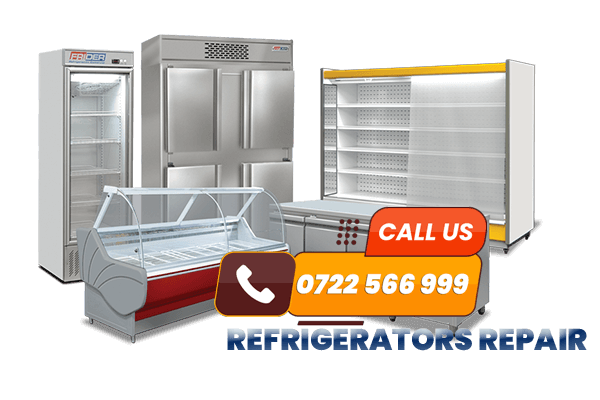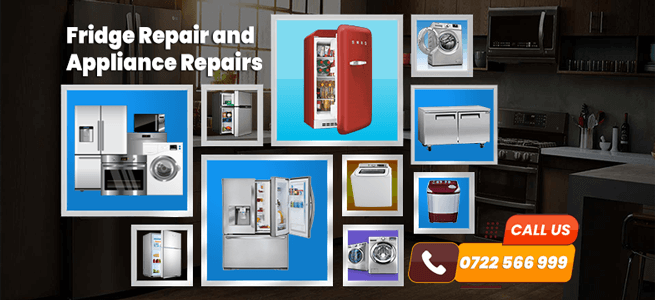
Fridge ice maker repair and replacement are common tasks encountered by homeowners, especially when dealing with modern refrigerators equipped with ice-making capabilities. These units provide convenience by constantly producing ice, but they can encounter issues over time, ranging from minor malfunctions to complete failure. Knowing how to troubleshoot and address these problems can save time and money.
In cases where troubleshooting and basic repairs don’t resolve the issue, it’s advisable to seek assistance from a professional appliance repair technician. They can diagnose complex problems and perform repairs safely and effectively, ensuring your fridge’s ice maker operates smoothly for years to come.

When your refrigerator’s ice maker stops working, it can be a frustrating inconvenience, especially in Nairobi’s warm climate. However, before rushing to call a repair technician, there are several common problems you can troubleshoot and potentially fix yourself. Here, we’ll explore some typical issues with Fridge Ice Maker Repair in Nairobi and suggest repair solutions.
One of the most common problems with ice makers is an inadequate water supply. If your ice maker isn’t producing ice or is producing smaller than usual ice cubes, check the water supply line to ensure it’s connected properly and hasn’t been kinked or damaged. Also, inspect the water inlet valve for any clogs or defects. Sometimes, debris can accumulate, blocking the flow of water.
Repair Solution: Clean the water inlet valve thoroughly to remove any debris or mineral deposits. If the valve is damaged, it may need to be replaced. Additionally, ensure that the water supply line is properly connected and free from obstructions.
Over time, the ice maker assembly itself can develop faults due to wear and tear. Components such as the motor, gears, or thermostat may malfunction, leading to ice production issues. If you notice that the ice maker isn’t cycling properly or isn’t dispensing ice, it could indicate a problem with the assembly.
Repair Solution: Inspect the ice maker assembly for any visible signs of damage or wear. If necessary, replace the malfunctioning components or consider replacing the entire assembly if it’s beyond repair. It’s advisable to consult the refrigerator’s manual or seek professional assistance for this task.
The freezer temperature plays a crucial role in ice production. If the freezer is too warm, it can hinder the ice maker’s ability to produce ice effectively. Conversely, if the freezer is too cold, it may cause the water supply line to freeze, preventing water from reaching the ice maker.
Repair Solution: Check the temperature settings on your freezer and ensure they’re set to the manufacturer’s recommended levels. Typically, the freezer should be set between 0°F and 5°F (-18°C to -15°C) to facilitate proper ice production. Adjust the settings as necessary and monitor the ice maker’s performance.
Some modern refrigerators are equipped with sensors that detect when the ice bin is full and automatically shut off the ice maker to prevent overfilling. If this sensor malfunctions, it can cause the ice maker to stop producing ice prematurely or fail to shut off when the bin is full.
Repair Solution: Locate the ice maker sensor (if applicable) and ensure it’s clean and free from any obstructions. If the sensor is defective, it may need to be replaced. Refer to the refrigerator’s manual or contact a qualified technician for assistance with sensor replacement.
A clogged water filter can impede the flow of water to the ice maker, resulting in reduced ice production or poor ice quality. Over time, mineral deposits and debris can accumulate in the filter, obstructing water flow.
Repair Solution: Replace the water filter at regular intervals as recommended by the refrigerator manufacturer. Most filters need to be replaced every six months to ensure optimal performance. If you notice a significant decrease in ice production, try replacing the water filter to see if it resolves the issue.
If none of the above solutions resolve the issue, there may be underlying electrical problems with the ice maker or the refrigerator itself. Faulty wiring, damaged circuitry, or a malfunctioning control board can all contribute to ice maker issues.
Repair Solution: In cases of electrical problems, it’s best to seek professional assistance from a qualified appliance repair technician. They will have the necessary expertise and tools to diagnose and repair electrical issues safely.
Fridge Ice Maker Repair in Nairobi can often be tackled with some basic troubleshooting and repair solutions. By identifying the underlying cause of the problem and addressing it promptly, you can enjoy a steady supply of ice from your refrigerator once

fridge-repair-nairobi-kenya-mombasa-thika-nakuru-eldoret